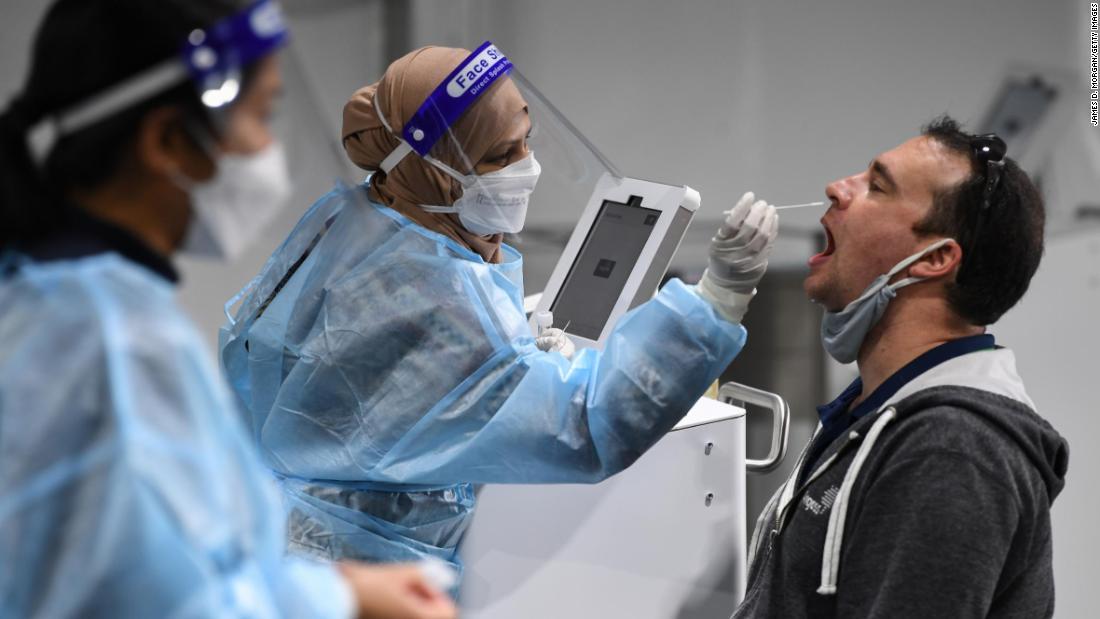Many world leaders, including US President Joe Biden, reacted swiftly to the news by
announcing a raft of travel restrictions on African countries, even though the variant has already been
detected in places like Australia, Hong Kong and Israel. While Omicron has not yet been found in the United States, Dr. Anthony Fauci, director of the National Institute of Allergy and Infectious Diseases,
said he "would not be surprised" if it has already made its way in.
At best, travel restrictions can help slow the spread of the variant and buy us time. At worst, they can hamper global communication, transparency and data sharing while discouraging countries from monitoring new variants. But while we wait to learn more about this viral variant, there are resources at our disposal to protect ourselves should Omicron spread to the United States. We should all do our part, which includes getting vaccinated and testing for Covid-19 when recommended while the medical community studies the variant and evaluates whether our vaccines will hold up against it.
Through there is much we don't yet know about Omicron, here are three things we do know:
The Omicron variant was first detected in a sample collected November 9 and
reported to WHO on November 24. All Covid-19 samples collected in the Gauteng province of South Africa between November 12 and 20 were
determined to be the Omicron variant, suggesting it had already become the dominant strain in that region. The variant has been detected in a number of other nations and continents, but because of great variation in viral sequencing surveillance efforts, undetected Omicron outbreaks may already exist in additional locations.
Omicron has a lot of mutations
The virus' genome has about
50 mutations, with roughly 30 of them found in the spike protein -- the structure the virus uses to get into the cells they attack. (This spike protein is also the basis of most mRNA vaccines, which deliver instructions for our immune systems to recognize and attack this portion of the virus.)
The World Health Organization has
reported that "preliminary evidence suggests an increased risk of reinfection with this variant, as compared to other (variants of concern)." Preparing for the worst, vaccine makers Pfizer and BioNTech have already announced they could
manufacture a new Omicron-specific vaccine in 100 days if required, subject to regulatory approval.
The severity and infectiousness are not currently well understood
Mutations can affect both severity (virulence) and infectiousness (transmissibility) of a virus, capable of rendering them either more or less dangerous to the public. Early observations in South Africa
suggest Omicron may spread more easily than Delta, although such early estimates are notoriously unreliable.
South African doctor Angelique Coetzee has
reported that she has so far observed around two dozen Omicron patients, mostly young men, about half of whom were unvaccinated, presenting with relatively milder symptoms such as severe fatigue. While potentially encouraging, this is a small sampling of all cases, and South Africa has a population that
skews much
younger than the United States and many
other countries, providing less opportunity to assess effects of Omicron on older, higher-risk individuals.
Overall, there has not been enough time for any understanding of the lethality of Omicron to be established. Gaining a better understanding of how Omicron behaves will take months of observations of additional subjects.
There are now systems in place at the national and international levels that help identify and characterize new variants. In the United States, the SARS-CoV-2 Interagency Group (SIG), jointly
established by a number of US health and defense authorities, focuses on monitoring emerging variants and their potential impact on critical SARS-CoV-2 countermeasures, including vaccines, therapeutics and diagnostics.
Similarly, the World Health Organization also
helps track SARS-CoV-2 variants on an international scale and works with multiple partners, national institutions and expert networks in monitoring and assessing variants that may pose an increased risk to global public health.
But as of now, the limited amount we know about Omicron leaves a lot of room for questions. Will it peter out like Mu or take over like Delta?
While we wait for answers, we need to continue to be vigilant. For all of us, this means getting vaccinated and, if eligible, getting the booster dose, wearing a mask and being mindful of the activities we engage in. If we get sick or are exposed to someone who is sick, getting tested and quarantining if we test positive is critical.
Vaccinating now is now more important than ever. Even if Omicron continues to spread, Delta will be the dominant strain of virus causing Covid-19 heading into winter,
according to Fauci. Vaccination protects against Delta, and may protect against Omicron as well.
At the public health level, we must continue to employ all the strategies to box in the virus: vaccination, testing, sequencing, surveillance, contact tracing and offering support services to those who need to quarantine or isolate. On the medical end, we must continue to develop newer generations of vaccines that can be easily scaled up to meet any variant specific threats.
The Omicron variant is another reminder of the risk we all face when vaccination levels are low throughout the world. Allowing the virus to spread unchecked gives it more opportunities to mutate without the blanket of protection vaccines offer at the community level. Lagging vaccination rates anywhere are a threat everywhere.
We can't afford to face another Delta-like foe. The toll is too great -- emotionally, physically, economically and financially.















0 Response to "How to fight Covid-19 while the scientists wait for answers on Omicron - CNN"
Post a Comment